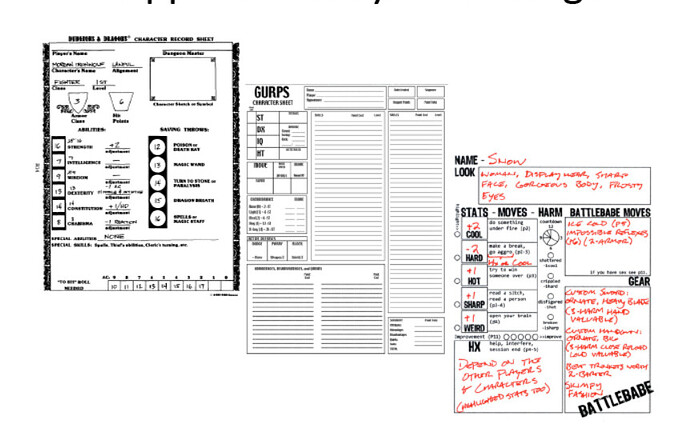Are you about to play a *World game, and feeling restricted by the list of playbooks? Are you looking for a way to freshen up your next game, whether personally, or as a group?
Before you get to hacking (or before you get to writing up new playbooks), try this custom character creation move:
When you pick up a playbook , whether familiar, beloved, or overlooked, ask the group - or ask yourself - what is most archetypal about this playbook?
“What is the one thing that, to us, makes a person The Hardholder ?”
Now, create the character, inverting that assumption:
When you invert an assumption , choose one of the following:
- The character plays entirely opposite to type, in terms of their personality, philosophy, outlook, or goals.
- The character occupies a station or role in society entirely opposite to expectations.
- The character is perceived by others (by society) as being someone totally different from what you would expect for that playbook.
As you look through the moves, gear, and Hx choices, justify each one. Some will be immediately obvious; others will be head-scratchers. Dig in and find the nugget around which you will form this new character.
If you are the MC, use that idea to form a landscape - physical, social, and psychic - which reflects that character’s position and values.
Apocalypse World
Assumption : The Angel is a healer; someone who cares about helping people, and wishes to eradicate disease and suffering.
Inversion : In your game, the Angel is a sadist, who invents - or creates! -
medical problems, wounds, and imaginary “plagues” in order to scare others into submission and garner power.
Justification : This Angel believes that only those whose insides she has seen can truly be trusted. She cuts and slices the world so she can find some semblance of security for herself.
Assumption : The Skinner is a gorgeous, nubile, desirable creature.
Inversion : In your game, the Skinner is an aging soldier with a limp.
Justification : There is something so magnetic about their stories, the twinkle in their eye, that everyone admires them, respects them, and wishes to be close to them. Their words soothe the hurt and excite the young, sowing the seeds for dreams of grandeur; their tales of a lost past are dangerously seductive.
Let yourself listen too long and you’ll find yourself in their bed.
Assumption : The Brainer is the weirdest wacko around, the most twisted and creepy individual.
Inversion : In your game, the Brainer is the only level-headed, sane person left. In the aftermath of the apocalypse, everyone else has lost their mind, and she is the last even-keeled survivor, clutching desperately onto reason and sensibility.
Justification : Your Brainer’s desperation has attracted the attention of the maelstrom, which has bestowed upon her powerful psychic gifts. Will she use her whisper projection, violation glove, and in-puppet strings to try to restore sense and sanity to those around her? Does she see her newfound weirdness as a problem to solve (the final erosion of everything she has been clinging to), or a tool to embrace?
Monsterhearts
Assumption : The Ghost is a nobody; a social outcast, overlooked, ignored, and easily forgotten.
Inversion : In your game, the Ghost is the most popular kid in school. He is the quarterback of the football team and Homecoming King.
Justification : His popularity has reached such a peak that other students have started to see him as above them or beyond them. Suddenly he realizes that no one really cares; no one sees his vulnerability or his pains. There is no one he can confide in, for no one would ever believe that he , the Homecoming King, could ever have any real problems in life! At the peak of his popularity… he’s never felt more alone.
And so on, of course.
Pick a different assumption each time.
Try it. Have fun.
